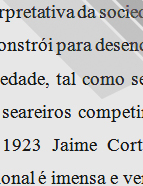

................................
To conclude, the third era would arrive : “Attempts at internal remodelling.” This should certainly have followed the independence of Brazil. However, the reforms of Mouzinho da Silveira, which aimed for this, remained incomplete, and the Fontista policies of external loans spilled over them, blocking the necessary internal transformations. Additionally, the Republic neither address ed nor “solve d the fundamental problem of nationality: creating jobs in the metropolis for citizens’ activities through the modification of the agrarian regime, making use of hydraulic resources, modernising work methods, importing scientific labour, and establishing a new, fundamentally active and productive pedagogy.” (Sérgio, Bosquejo, pp. 50 and 59-60).
At the same time, there was a need to combat the delirious romanticism that had settled in Portugal, along with the accompanying—or causing—creative incapacity. “This romanticism, making us incapable of modifying the present and preparing for the future, equally prevents us from intelligently evaluating the past.” This was the opinion of Raul Proença, who added: “We see in the enterprises of our ancestors, in Henry the Navigator, in Nuno Álvares, in the princes of Ceuta, mere adventures of triumphant sentimentalism, unrestrained mysticism, Bergsonian intuitions, voices of the Race, sphinx-like purities, artesian wells of creative sensitivity.” But, the seareiro countered, “all these enterprises were works of meditated and methodical organi s ation, of a high practical spirit, carried out with all the scruples, all the details, and all the circumspection of realistic intelligence.” (Proença, Páginas [Pages], 2nd series, p. 158). This was Seara Nova 's stance on h istory, distancing itself from and combating empty lyrical outbursts and backward-looking invocations, even when embellished in poetic saudosista beaut y in the style of Teixeira de Pascoaes. For the seareiros, it was necessary to return to the spirit of the 5 th of October, but “return by advancing,” as stated in the magazine's initial manifesto. Thus, the romanticised fantasies supported by history had to be thwarted .
